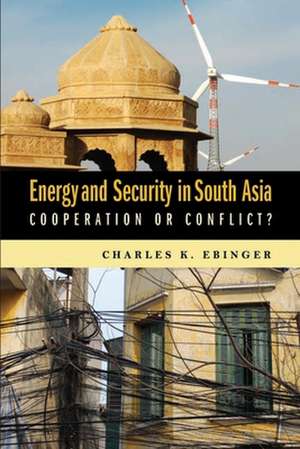Energy and Security in South Asia: Cooperation or Conflict?
Autor Charles K. Ebingeren Limba Engleză Paperback – 31 aug 2011
Economic growth and burgeoning populations have put South Asia's energy security in a perilous state. Already energy and power shortages are stunting development in some of the region's least developed locations spurring political insurgences and social dislocation. Should this trend continue, Ebinger argues the Subcontinent will face dire economic, social and political crises. In Energy and Security in South Asia, Brookings ESI director Charles Ebinger, a long-time adviser to South Asian governments, lays out the current regional energy picture arguing that the only way to achieve sustainable energy security is through regional collaboration both within the subcontinent as well as with regional neighbors in the Middle East and Central and Southeast Asia,
Dr. Ebinger commences by illustrating the present-day energy environment in each nation as well as the obstacles governments confront in addressing them. Among the issues examined are: (1) the technical strains that near double-digit economic growth are putting on India's dilapidated power infrastructure, (2) the economic costs the country is incurring by increasing reliance on the Middle East for oil and gas resources; (3) the prospects for expanded wind, solar, energy efficiency and nuclear power generation in India to help reduce the nation's growing carbon footprint as it accelerates the use of coal; (4) the implications of Pakistan's expanded use of coal; (5) an analysis of how poor energy pricing systems are bringing about an energy shortage throughout the region (6) an examination of how strains in Indo/Bengali relations threaten the construction of vital regional energy infrastructure projects; (7) a discussion of how continued political upheaval in Nepal is causing power shortages of up to 20 hours per day; and (8), an analysis of how hydropower development is fuelling Bhutan's "Gross National Happiness" campaign. In addition to individual domestic concerns, each nation shares a crisis whereby hundreds of millions on the Subcontinent lack access to electricity and burn inefficient resources such as fuel wood and biomass for lighting, heating, and cooking, thus contributing sizeable carbon emissions.
The looming Indian Subcontinent energy crisis will force more than half a billion people – and counting–from emerging from dire poverty, thus potentially sparking domestic and regional instability in an already treacherous area.
Dr. Ebinger commences by illustrating the present-day energy environment in each nation as well as the obstacles governments confront in addressing them. Among the issues examined are: (1) the technical strains that near double-digit economic growth are putting on India's dilapidated power infrastructure, (2) the economic costs the country is incurring by increasing reliance on the Middle East for oil and gas resources; (3) the prospects for expanded wind, solar, energy efficiency and nuclear power generation in India to help reduce the nation's growing carbon footprint as it accelerates the use of coal; (4) the implications of Pakistan's expanded use of coal; (5) an analysis of how poor energy pricing systems are bringing about an energy shortage throughout the region (6) an examination of how strains in Indo/Bengali relations threaten the construction of vital regional energy infrastructure projects; (7) a discussion of how continued political upheaval in Nepal is causing power shortages of up to 20 hours per day; and (8), an analysis of how hydropower development is fuelling Bhutan's "Gross National Happiness" campaign. In addition to individual domestic concerns, each nation shares a crisis whereby hundreds of millions on the Subcontinent lack access to electricity and burn inefficient resources such as fuel wood and biomass for lighting, heating, and cooking, thus contributing sizeable carbon emissions.
The looming Indian Subcontinent energy crisis will force more than half a billion people – and counting–from emerging from dire poverty, thus potentially sparking domestic and regional instability in an already treacherous area.
Preț: 258.91 lei
Nou
Puncte Express: 388
Preț estimativ în valută:
49.54€ • 51.90$ • 41.06£
49.54€ • 51.90$ • 41.06£
Carte tipărită la comandă
Livrare economică 09-23 aprilie
Preluare comenzi: 021 569.72.76
Specificații
ISBN-13: 9780815704119
ISBN-10: 0815704119
Pagini: 224
Ilustrații: Illustrations, maps
Dimensiuni: 152 x 229 x 15 mm
Greutate: 0.36 kg
Editura: Brookings Institution Press
Colecția Brookings Institution Press
ISBN-10: 0815704119
Pagini: 224
Ilustrații: Illustrations, maps
Dimensiuni: 152 x 229 x 15 mm
Greutate: 0.36 kg
Editura: Brookings Institution Press
Colecția Brookings Institution Press
Notă biografică
Charles K. Ebinger is director of the Energy Security Initiative at the Brookings Institution, where he is a senior fellow in Foreign Policy. He also teaches at the Johns Hopkins University's Nitze School of Advanced International Studies. He has served as an energy policy adviser to more than fifty governments.
Descriere
Economic growth and burgeoning populations have put South Asia's energy security in a perilous state. Already energy and power shortages are stunting development in some of the region's least developed locations spurring political insurgences and social dislocation. Should this trend continue, Ebinger argues the Subcontinent will face dire economic, social and political crises. In Energy and Security in South Asia, Brookings ESI director Charles Ebinger, a long-time adviser to South Asian governments, lays out the current regional energy picture arguing that the only way to achieve sustainable energy security is through regional collaboration both within the subcontinent as well as with regional neighbors in the Middle East and Central and Southeast Asia,
Dr. Ebinger commences by illustrating the present-day energy environment in each nation as well as the obstacles governments confront in addressing them. Among the issues examined are: (1) the technical strains that near double-digit economic growth are putting on India's dilapidated power infrastructure, (2) the economic costs the country is incurring by increasing reliance on the Middle East for oil and gas resources; (3) the prospects for expanded wind, solar, energy efficiency and nuclear power generation in India to help reduce the nation's growing carbon footprint as it accelerates the use of coal; (4) the implications of Pakistan's expanded use of coal; (5) an analysis of how poor energy pricing systems are bringing about an energy shortage throughout the region (6) an examination of how strains in Indo/Bengali relations threaten the construction of vital regional energy infrastructure projects; (7) a discussion of how continued political upheaval in Nepal is causing power shortages of up to 20 hours per day; and (8), an analysis of how hydropower development is fuelling Bhutan's "Gross National Happiness" campaign. In addition to individual domestic concerns, each nation shares a crisi
Dr. Ebinger commences by illustrating the present-day energy environment in each nation as well as the obstacles governments confront in addressing them. Among the issues examined are: (1) the technical strains that near double-digit economic growth are putting on India's dilapidated power infrastructure, (2) the economic costs the country is incurring by increasing reliance on the Middle East for oil and gas resources; (3) the prospects for expanded wind, solar, energy efficiency and nuclear power generation in India to help reduce the nation's growing carbon footprint as it accelerates the use of coal; (4) the implications of Pakistan's expanded use of coal; (5) an analysis of how poor energy pricing systems are bringing about an energy shortage throughout the region (6) an examination of how strains in Indo/Bengali relations threaten the construction of vital regional energy infrastructure projects; (7) a discussion of how continued political upheaval in Nepal is causing power shortages of up to 20 hours per day; and (8), an analysis of how hydropower development is fuelling Bhutan's "Gross National Happiness" campaign. In addition to individual domestic concerns, each nation shares a crisi











